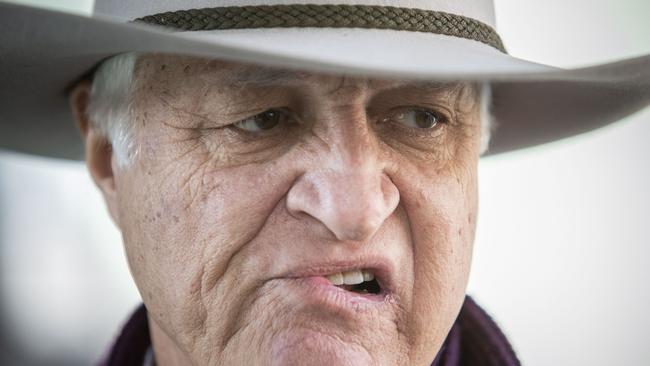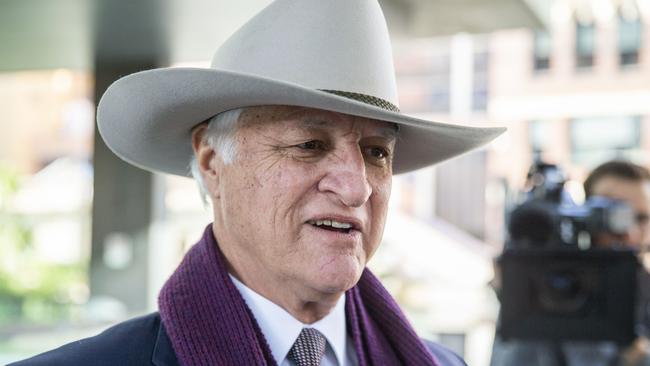Banking royal commission: Bob Katter rebuked by Kenneth Hayne
MP Bob Katter has twice interrupted a hearing into farm lending but was told: “You’re not the only one who is concerned.”

Royal commissioner Kenneth Hayne has hit back at demands from independent MP Bob Katter to outline proposals to clean out misconduct from the farming finance sector, after the parliamentarian disrupted hearings in Brisbane for a second time today.
Just before the royal commission took a break for lunch, Mr Katter, the Member for Kennedy, interrupted proceedings to demand why Mr Hayne had not yet delivered proposals to clean up the finance sector.
“Could I just ask — are we going to address why these things happen and what we can do to improve it in the future,” Mr Katter said, noting that he was not “being critical” of the inquiry.
My Hayne responded that he had “indicated the course” the royal commission would follow.
“All I will say to you is that we are looking at these things at the moment through the lens of particular case studies and there is a deal of work that goes on behind the scenes before during and after,” Mr Hayne said.
“Ultimately the fruits of that work are going to have to appear in my report and that’s the way that I will have to deal with that,” he said.
“You’re not the only one who is concerned Mr Katter, a lot of people are concerned,” Mr Hayne said.
It was the second interjection from Mr Katter at the hearing, who earlier yelled out from the crowd assembled in the Brisbane Magistrates Court “Can’t hear ya”, as counsel assisting Rowena Orr began to interrogate ANZ executive Benjamin Steinberg.
Mr Hayne scolded Mr Katter, saying: “I won’t have interruptions like that, I just won’t have it.”

It came after a lengthy testimony from ANZ head of commercial lending services Ben Steinberg, who has repeatedly failed to confirm whether its treatment of farmers following a calamitous takeover of Landmark Financial Services in 2010 fell below community expectations or breached the Banking Code of Conduct.
Mr Hayne said Mr Steinberg was “trying to have the penny and the bun” by saying that ANZ was acting consistently in a way that was not a breach of the code.
Mr Steinberg accepted that ANZ’s behaviour fell below community expectations, but did not accept that it acted unreasonably in its dealings with farmers Arthur and Rhonda Cheeseman.
They had been Landmark customers since 2004, with a loan facility of almost $3 million. The couple were under pressure from ANZ to sell their properties to clear their debt as they were struggling to sell their lentil crops. ANZ at one point gave the Cheesemans just six weeks to sell all their properties. If this failed, the bank would take over their properties within seven days.
The Cheesemans offered ANZ a proposal to clear the debt, which the bank rejected.
Ms Orr said Mr Steinberg “described these as reasonable offers” put to ANZ. “I want to put to you that ANZ’s refusal to accept them was unreasonable,” she said, after Mr Steinberg said the bank’s behaviour was not unreasonable.
“I can see why any member of the community would see those facts and not accept those standards,” Mr Steinberg responded.
Mr Hayne then went on to ask Mr Steinberg what was the “right thing to do at the time of these events”. Mr Steinberg responded ANZ should have structured a different arrangement with the Cheesemans to potentially allow them to retain some form of home ownership and a way to earn an income.
Mr Hayne said he was therefore struggling to understand why ANZ refused to say it hadn’t fallen below community standards in this example.
“When we analyse it clinically, we did in this case what we said we were going to do,” Mr Steinberg said.
Mr Katter, a key proponent of the royal commission, yesterday introduced to parliament a private member’s bill to divide the banks. Mr Katter’s bill, which is unlikely to be legislated, aims to separate retail banking activities from risky wholesale and investment banking. “The situation in Australia is ugly and it is evil and this legislation is needed to overcome those problems,” Mr Katter said.





To join the conversation, please log in. Don't have an account? Register
Join the conversation, you are commenting as Logout